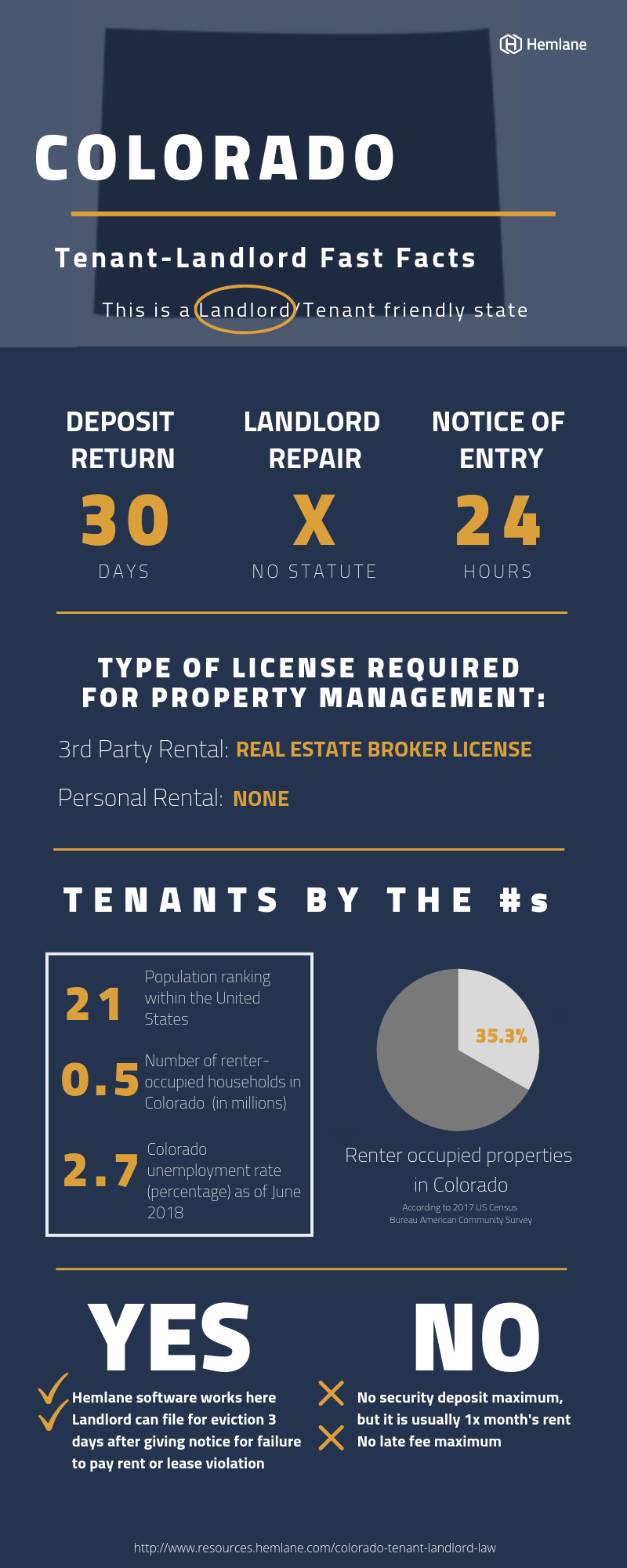

Navigating the rental market in Colorado involves understanding a complex set of tenant-landlord laws designed to ensure a fair and balanced relationship between both parties. This comprehensive guide provides an overview of the essential aspects of Colorado's rental laws, covering security deposits, rent control, repairs and maintenance, evictions, squatters' rights, leases, and additional specific regulations. Whether you are a tenant or a landlord, familiarizing yourself with these laws can help you protect your rights and fulfill your obligations under Colorado law.
Security deposits are funds tenants pay to landlords at the beginning of a lease to cover potential damages or unpaid rent. Colorado law outlines specific regulations on how security deposits should be handled.
Colorado does not have statewide rent control laws, and local governments are prohibited from enacting rent control measures on private residential properties.
Colorado law mandates that landlords maintain rental properties in a habitable condition and make necessary repairs in a timely manner.
The eviction process in Colorado is strictly regulated to ensure due process for tenants.
Squatters in Colorado can claim ownership of property through adverse possession if they meet specific legal requirements.
In Colorado, a lease agreement can be written or oral, but written leases provide more legal protections for both landlords and tenants.
For a lease to be legally valid in Colorado, it must include:
Colorado law prohibits certain lease clauses while other terms are optional:
Prohibited Lease Terms:
Allowable Lease Terms:
In Colorado, landlords must provide tenants with "quiet enjoyment" of the rental unit, meaning landlords cannot enter the property without proper notice except in emergencies.
Landlords in Colorado have the right to enter rental units at reasonable times for the following reasons:
Landlords must give tenants at least 24 hours advance notice before entering rental units. This notice can be provided orally or in writing and must state the reason for entry and the approximate time.
Tenants have the right to deny or set limitations on a landlord's access to the rental unit. However, tenants cannot unreasonably deny access when the landlord has a lawful reason to enter, such as making repairs or showing the property to prospective tenants.
Landlords can terminate a lease or rental agreement for several reasons, including nonpayment of rent, material noncompliance with the lease, providing false information on a rental application, illegal activity, or lease expiration.
If a tenant does not comply with the notice of lease termination, the landlord must go through the eviction process, including filing an eviction lawsuit and appearing before a judge. The entire eviction process can take 3-6 weeks depending on the county and court schedule.
Colorado has strong laws prohibiting housing discrimination. Landlords must comply with both federal and state fair housing laws.
Under Colorado law, landlords cannot refuse to rent, charge higher rents, or impose different terms based on a renter's:
Landlords must respond to bed bug infestations within 96 hours of being notified by a tenant and cannot pass treatment costs onto tenants unless there is evidence of tenant negligence.
In Colorado, landlords can prohibit smoking in rental units as long as the policy is clearly stated in the lease agreement. Landlords cannot retroactively prohibit smoking for existing tenants unless their lease prohibits smoking. There are no state laws prohibiting smoking in multi-unit housing, but some local jurisdictions have enacted smoke-free housing ordinances.
Landlords in Colorado can implement pet policies, including charging pet deposits and setting reasonable restrictions on the type, size, and number of pets allowed. These policies must be clearly disclosed in the lease agreement. Exceptions are made for service and assistance animals, which must be accommodated regardless of the landlord's pet policy (C.R.S. § 24-34-802).
If a tenant abandons a rental unit, the landlord must make reasonable efforts to notify the tenant before disposing of any personal property left behind. Landlords must store abandoned property in a safe location for at least 7 days. After proper notice, landlords can sell or dispose of the abandoned property but must turn over any proceeds from a sale to the tenant (C.R.S. § 38-20-116).
Colorado law prohibits landlords from retaliating against tenants who exercise their legal rights. Examples of retaliation include evicting, increasing rent, or decreasing services because a tenant filed an official complaint or participated in a tenant organization. There is a legal presumption of retaliation if adverse action is taken within 90 days of the tenant's protected action (C.R.S. § 38-12-509).
By understanding and adhering to these laws, both landlords and tenants in Colorado can ensure a fair and legally compliant rental experience. For more detailed information, refer to the specific Colorado Revised Statutes mentioned.
Renters have the right to a habitable living environment and protection against discrimination based on race, color, religion, sex, disability, familial status, and other protected classes.
Recent changes include the requirement for landlords to provide tenants with a 60-day notice for rent increases and the prohibition of evictions during extreme weather conditions (HB19-1118 and HB20-1009).
Landlords are responsible for maintaining the rental property in a safe, habitable condition, including providing essential services like heat, water, plumbing, and electricity (C.R.S. § 38-12-503).
Landlords must give tenants a 10-day notice for nonpayment of rent and a 10-day notice to cure for lease violations before initiating eviction proceedings (C.R.S. § 13-40-104).
Landlord retaliation includes actions like increasing rent, decreasing services, or evicting a tenant in response to the tenant exercising their legal rights, such as filing a complaint or joining a tenant organization (C.R.S. § 38-12-509).

Get the Latest in Real Estate & Property Management!